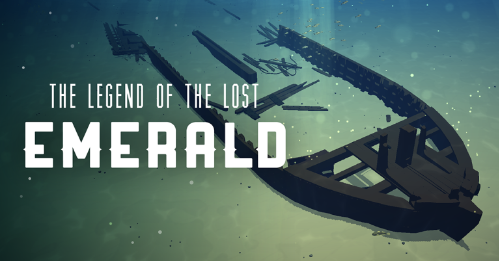WCER’s Field Day Collaborates with Wisconsin Sea Grant to Develop Shipwrecks Game
October 16, 2025 | By Karen Rivedal, Office of Research & Scholarship

When Field Day Director David Gagnon wanted to explore making a new online learning game for young students about the Great Lakes, Gagnon’s campus colleague Anne Moser knew immediately what the game should be about—shipwrecks.
“I knew that shipwrecks really capture kids’ imaginations,” said Moser, the education coordinator and senior special librarian for Wisconsin Sea Grant, part of the Aquatic Sciences Center at the University of Wisconsin–Madison. “The game challenges the kids to solve a puzzle, and the cool thing is that the puzzle exactly mirrors the professional practice of maritime archeology.”
“The goal of education at Wisconsin Sea Grant is to spark a passion for the Great Lakes and to inspire the next generation of leaders, and I have seen how shipwreck stories do just that,” Moser said. “We were excited to share this with the educators and youth we work with throughout Wisconsin.”
Wisconsin Sea Grant also provided seed money for the game and helped Field Day connect with content experts such as the Wisconsin Historical Society’s working maritime archeologists. With a game prototype in hand, Field Day and Sea Grant could then approach PBS Wisconsin, which became a major funding and distribution partner.
“If it wasn’t for Sea Grant, this game wouldn’t exist,” said Jim Mathews, Field Day’s lead producer on the game, titled Legend of the Lost Emerald.
“Anne was interested in developing a game that would promote Great Lakes literacy and complement Wisconsin Sea Grant’s existing Great Lakes-related educational resources, including material aimed at K–12 teachers and students, Mathews added. “One of the key ideas that emerged from this broad interest was developing a game for elementary-aged students that focused on shipwrecks in the Great Lakes.”
Legend of the Lost Emerald is an immersive, boldly illustrated, point-and-click adventure game that teaches while it entertains. The free, award-winning game invites students to “step into the shoes of Jules,” a maritime archaeologist character working to recover the stories behind shipwrecks inspired by real Great Lakes history. The game gives learners in grades 4–6 the experience of using the same tools, practices, and skills that maritime archaeologists use to locate and dive for shipwrecks in the Great Lakes. Young students use critical thinking and historical inquiry skills in the game, meeting Wisconsin academic standards in English language arts and social studies.
To kick off creative thinking for the game, Field Day sponsored a brainstorming event at the Wisconsin Maritime Museum in Manitowoc that brought together Field Day game designers with maritime archeologists from the Wisconsin Historical Society, Sea Grant staff, and Wisconsin teachers who would eventually use the game in their classrooms.
During that day’s activities, one group of teachers even learned to sing sea shanties, Field Day Creative Director Sarah Gagnon recalled, snippets of which would figure into the game’s music production. Key historical details for the game came from the historical society’s maritime preservation and archeology program experts, especially Maritime Archaeologist Tamara Thomsen.
“All the shipwrecks in the game are fictionalized but are based on real ships that we learned about through the amazing team at the Wisconsin Historical Society and Wisconsin Sea Grant,” Sarah Gagnon said, highlighting maritime archeologists Caitlin Zant and Tori Kiefer, along with Thomsen and Moser.
To learn more about Legend of the Lost Emerald, watch a minute-long, animated trailer for the game, and a blog post Field Day published when the game was released in 2022. The game also won gold in the 2022 International Serious Play Awards Program, a leadership organization in the field of game-based learning for education or training.
***************
Wisconsin Sea Grant is a statewide program of research, education, outreach and technology transfer dedicated to the stewardship and sustainable use of the nation’s Great Lakes, the world’s largest system of freshwater, with extensive shorelines on Lake Michigan and Lake Superior. Headquartered at UW–Madison, the research institute is part of a national network of 34 university-based water programs based mainly on the country’s coasts and funded primarily through the National Oceanic and Atmospheric Administration, with contributions from participating states and the private sector.
Field Day Lab is a research lab and game design studio that brings contemporary research to the public, using game data to understand how people learn. Publicly funded through grants, the team at Field Day Lab is committed to providing games to educators for free. Using an ethos that games turn complicated topics into fun, hands-on experiences that reach people, the lab aims to better understand how people learn with games, building out theory and designing effective interventions.
Among its popular and award-winning games are “Headlines and High Waters,” designed to help students build media literacy, and “Wake: Tales From the Aqualab,” in which students take on the role of a scientist studying ocean ecosystems. Educators and students can access Field Day’s games in addition to many other free educational games in The Vault at https://vaultlearninggames.org.
The Wisconsin Center for Education (WCER) at UW–Madison’s #1 ranked public School of Education is one of the first and most productive education research centers in the world. It has assisted scholars and practitioners in developing, submitting, conducting, and sharing grant-funded education research for over 60 years.
WCER’s mission is to improve educational outcomes for diverse student populations, positively impact education practices, and foster collaboration among academic disciplines and practitioners. Learn more at wcer.wisc.edu.


